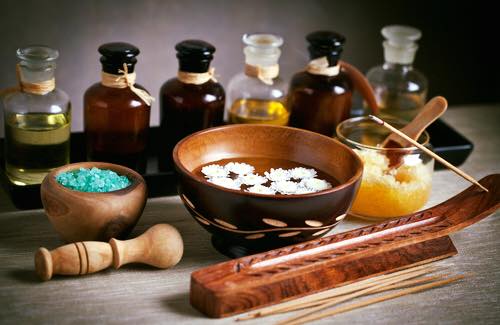The skin reflects our overall health
Our skin is a unique organ that connects us to the outside world and reflects our inner balance. The condition of our skin can reveal signs of stress, emotions, digestive problems, lifestyle, age, and weather influences in the form of dryness/wrinkles, sensitivity, oiliness/blemishes. Managing your diet, lifestyle, and proper skincare will help you maintain your skin's health for as long as possible.

The main character: pitta
The skin is strongly influenced by the blood- rakta dhatu – and the subdosha bhrajaka pitta (responsible for color, temperature, and the skin's ability to absorb oil). Skin problems can often be an indication of increased pitta (heat), an excess of ama (toxins) or imbalance in the other doshas (vata and kapha). Proper nutrition (and therefore digestion), sufficient rest, emotional well-being, and a suitable daily routine are important factors for the right balance.
Below you will find valuable tips for each season:
Spring (kapha season)
The skin can be a bit fatter feel which puts you at increased risk of blemishes or a dull appearance. The transition from cold to warm causes increased sebum production.
- Choose light and warming foods that are stimulating. Avoid heavy and fatty foods.
- Use herbal powders to cleanse the skin, such as e.g. ubtan – an Ayurvedic herbal mixture – or a mild scrub with oatmeal.
- Steam with herbs like tulsi (soothing) and neem (antiseptic).
- Avoid heavy creams/lotions. Choose light creams/oils or rose water.
Summer (pitta season)
Because heat increases the pitta dosha, this can quickly lead to sensitive, red, or irritated skin. There is an increased risk of pimples, inflammation or sunburn.
- Cool the skin from within by eating seasonally: cucumber, coconut, rose water and aloe vera are perfect for lowering internal heat.
- Use rose water to soothe the skin calm down, or coconut oil for light hydration without weighing the skin down.
- Cool your skin after sun exposure with aloe vera or a soothing massage with brahmi oil.
Autumn (vata season)
As the transition from summer to autumn (it gets colder and windier), the skin can feel drier, rougher, and more sensitive. This is a symptom of increased vata.
- Focus on warm, liquid and nutritious dishes such as soups, stews, ghee, nuts.
- Apply sunscreen to your skin regularly with pleasant warming oil such as sesame or almond oil.
- Masks with avocado, honey or milk can help nourish and soothe the skin. hydrate.
- Protect yourself from the windCover the skin with a protective, greasy cream.
Winter (kapha season)
Winter can make skin both dry and dull. The cold air and dry indoor heating cause moisture loss, making it need extra protection.
- Choose warming, richer dishes. Add ghee, soups, warm herbal teas, and olive oil to your diet to nourish your skin from within.
- Oil massages (abhyanga) are essential for keeping skin supple. Use a rich oil like sesame or coconut oil for deep hydration.
- Protect yourself from the cold: Cover your skin with a protective cream or ghee when exposed to the cold.
Extra tips for radiant skin all year round
- Start the day with lukewarm water with lemon or aloe vera to support your digestion and purify the skin from within.
- Get enough sleep – the skin regenerates the most during sleep.
- Triphala is a classic Ayurvedic herbal formula that helps cleanse the intestines and remove toxins, which also benefits the skin.
- Self-massage (abhyanga) With dosha-specific oils, it helps stimulate circulation and nourish the skin. This calms the nervous system and supports a radiant complexion.
Want to learn more about Ayurvedic skincare? Contact us, we're happy to advise you! We use a variety of natural oils and natural cosmetics that optimally support your skin's health.
